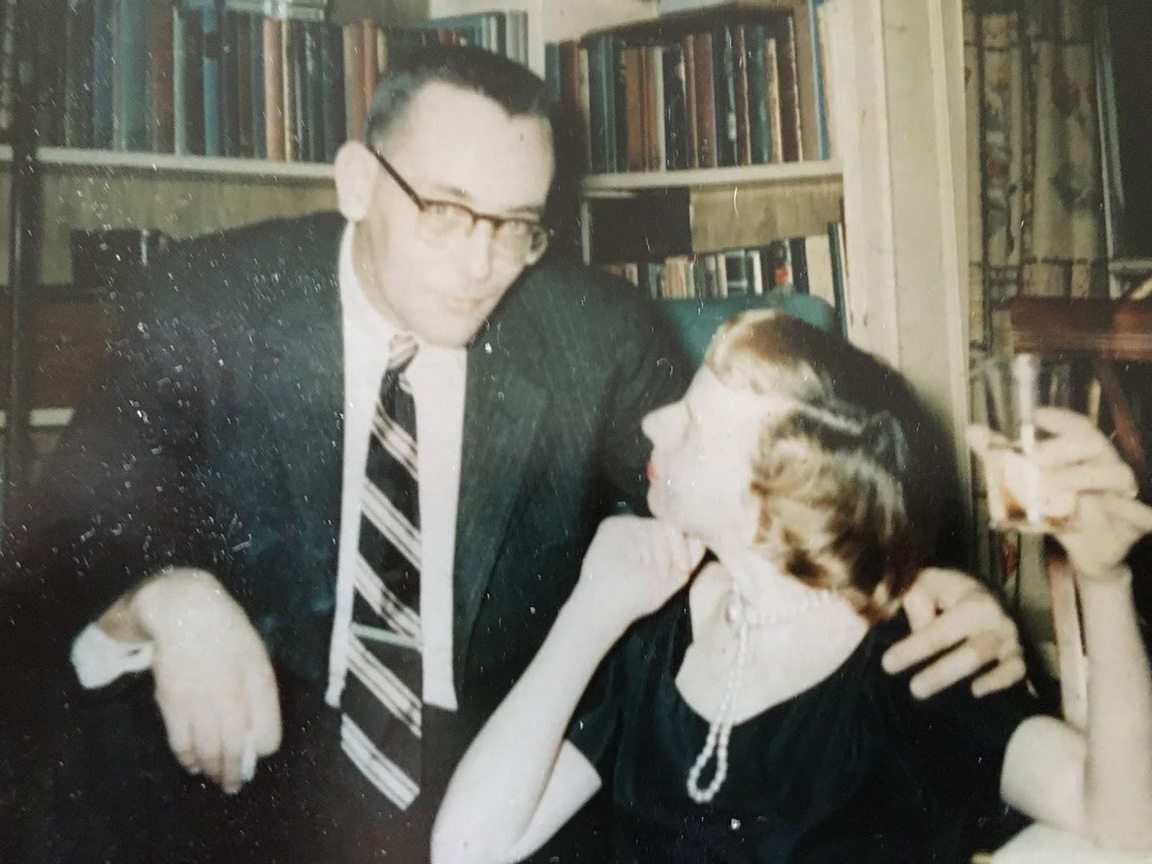
My father, Harvey, with my mother, Jean Sharley Taylor, somewhere in Detroit, sometime in the 1950s.
My most vivid memory of my father, Harvey, is him driving around the block three times on the way home after taking me for a haircut. I was nine or ten. We lived in Detroit, on the east side. My mother, Jean, had thought it would make for a good Saturday outing. But she’d wanted a trim, and the barber gave me a crewcut. She was going to be mad, and Harvey knew it.
Both newspaper people, my parents separated when I was two. His drinking created too much chaos. Once, when it landed him in the hospital, she asked him why he drank so much. “Baby,” he said, “I like to drink.” He had a severe stutter, and it may be that drinking made him feel less ashamed.
Either way, she and I never talked about it. My godfather Louis told me the hospital story. I never heard Jean say Harvey was an alcoholic. These days, we would say she was codependent. The old way of saying it was that Harvey was the love of her life. She idealized him for his intelligence and wit and the way he made her feel like a character in a play by Noel Coward or Neil Simon. In this photo, the only one I have of them together, she’s sitting on the floor, wearing her pearls and cradling a drink, gazing up at him with her chin in her hand. As a reporter, she worked with photographers all the time. There is no doubt in my mind that she was striking a pose.
Born in Georgia, Harvey was the son of a famous piano teacher, trained in Paris. Jean never got over the humiliation of hosting her mother-in-law in our little apartment in Highland Park only to to be bawled out for using the engraved Taylor silver flatware, which she’d given my parents as a wedding present, on the Formica table in the kitchen. I still have some of my grandmother’s sheet music. For whatever reason, she never took her son on as a student. He picked piano up in his twenties, when it was too late. He covered the Detroit Symphony as a music critic and was so hard on one music director and conductor that members of the orchestra challenged him to a duel. He would perform for them, and they’d review it. They panned him, of course. He also panned “The Music Man” and raved about Elvis.
A few other legends persist. Jean insisted that, during a Detroit newspaper strike, when he was working at an advertising firm, he had thought up the name Ball Park Franks when Hygrade Food Products held a contest. According to Wikipedia, the winner was a company salesperson named Mary Ann Kurk. But my mother was, as always, confident about her version of events.
Preaching in church on Fathers Day, I mentioned the emotional complexity experienced by those whose parents fall short. My dad and his addiction let my mom and me down. She struggled financially for many years, and he did little to help. I never knew quite what to say to him, and when he died in 1975, we hadn’t been in touch for several years. His absence sent me on a lifelong search for substitute dads and made me feel responsible for my mother’s emotional well-being. Until my mid-teens, when I went off to boarding school, I tagged along to cocktail parties instead of going to little league games and sleepovers. The word today is parentification. Lots of pastors and therapists have experienced it and the resulting fear of being unwanted or unlovable.
So my Fathers Day settlement includes the effects on a small family and a young life of alcohol abuse disorder, codependency, and parentification. But they’re not the whole story. I also remember the smell of Harvey’s martinis and the way it sounded when he opened a pack of cigarettes. The weight of his silver filigree lighter, a gift from his long-suffering girlfriend Betty. And his gift of my love of music. Hearing a pianist playing Mozart, Beethoven, or Chopin, I can feel his pleasure. I can still conjure up his smile and inebriated giggle.
Though my mom’s been gone since 2015, I suppose I still see him through her adoring eyes. Codependency again for sure. But I don’t mind. He was my dad. I have a hundred questions I wish I’d asked him. Maybe someday.
